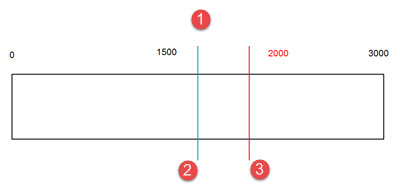

Example of the PC-DMIS Vision Probe Toolbox showing CWS scan parameters
Sensor Frequency
The measurement rate sets the number of measured values the CWS records per unit time. For example, when the measurement rate is set at 2000 Hz, 2000 measurement values are taken per second. The intensity indicator on the display can help you select the correct setting. In the case of surfaces with very low reflectivity, it may be necessary to reduce the measurement rate. This has the effect of illuminating the optical sensor‘s CCD-line longer and thus making it possible to measure even if the reflected intensity is very low.
Auto Lamp and Exposure Time
Under Lamp Intensity, you can select the relative pulse duration of the LED, and with it the effective brightness of the light source. The Auto Lamp option is useful when the measurement surface changes in reflectiveness. If, for example, you are measuring a highly reflective surface, on which the highest measurement rate still results in over-modulation, then it makes sense to set Auto Lamp to No and set the Lamp Intensity option manually.
Another option would be to leave Auto Lamp set to Yes, and reduce the exposure time. If a poorly reflecting surface is to be measured with a high measurement rate, this can be achieved by means of a longer pulse duration or longer exposure time.
Dark reference is absolutely necessary after every change to the exposure time. Please refer to the appropriate section of your CWS Unit Operators Manual.
Filter (Sensor Intensity)
Using the Threshold value, all data between noise and the measurement signal are filtered out. Peaks falling beneath this threshold are recognized as invalid and appear on the display as the measurement value 0 (zero).
There is no linear relationship between Filter (Sensor Intensity) and "Intensity". For example, if you set Filter (Sensor Intensity) = 50, it doesn't necessarily mean that all values below an intensity of 50 are filtered out.
For a measurement rate under 1kHz, a Filter (Sensor Intensity) minimum of 40 is recommended. This prevents measurement values of too low an intensity, which rise only slightly above the noise, and falsifies the measurement. At a measurement rate of 1kHz and higher, a minimum of 15 is expedient to fully exploit the device’s dynamics.
Offset
Depending on the reflectiveness of the surface and the measurement rate (frequency), optimal intensity values may occur in different areas of the sensor’s range.
The Offset setting moves to the best scan area for the sensor. The input for this offset is a + or – value in mm.

1 - Distance (Sensor Range for a 3mm Sensor)
2 - Offset = 0.000
3 - Offset = 0.500
Graph showing effects of changing the Offset value
Focus
The Focus button reads the current machine position and the distance value from the CWS sensor. These values calculate the focus position that appears in the Focus box.
Note on Filter Modes
The Speed and Frequency parameters define the point density of the sensor. In the case of scans, PC-DMIS then performs secondary filtering as defined from the Nullfilter and Point Density settings.
Chromatic White Light Sensor Probe Readouts Window
If the Chromatic White Light Sensor (CWS) is the active sensor, the Probe Readouts window displays the X, Y, and Z readouts, plus the following:
Intensity - The value for this readout is a percentage that appears in a circular graphic. An intensity value above 99% indicates a measurement error; for example, the sensor may be out of detection range. If a measurement error occurs, the non-gray part of the graphic turns red.
Distance - The value for this readout is in the current unit of measurement (inches or millimeters). The value appears in a circular graphic. If the distance value is within 10% of the upper or lower limit of the sensor range, the non-gray part of the graphic turns red.
For these readouts to appear, do not select the CWS Laser tab. Once you select it, the readouts are no longer sent to the Probe Readouts window.
More: